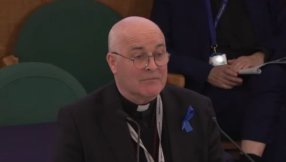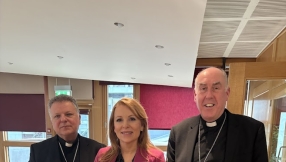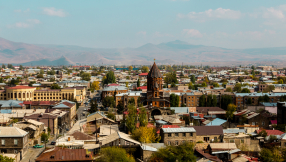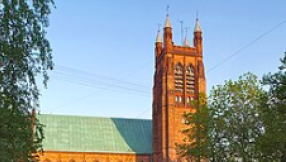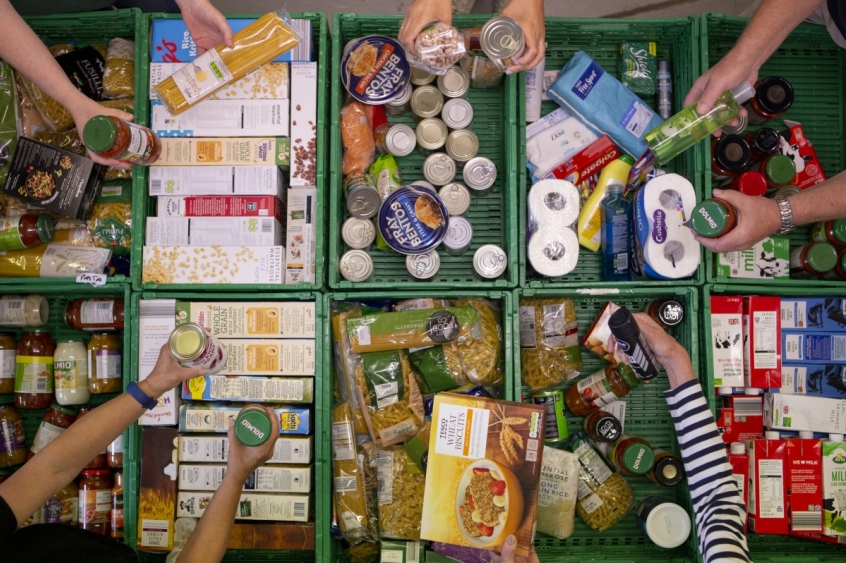
I have been in my role as a food bank manager in South-East Glasgow for 12 years and last year our food bank alone provided 11,500 food parcels to people facing hardship, a third of the staggering 33,405 that were distributed across the whole of Glasgow. Through my work, I encounter people each week who are experiencing severe loneliness, isolation and hunger, and struggle to afford the necessary essentials to get by each day.
Often, by the time people come to us for support, they have run out of options and are struggling with feelings of shame and stigma. Recent research by the Trussell Trust found that despite 95% of people who seek help saying they were treated with dignity and respect at food banks, 60% said that they feel embarrassed while receiving support.
The Trussell Trust's most in-depth study of hunger in the UK also revealed that one in seven people had faced hunger in the previous year. One in four individuals who walk through our food bank doors experience severe social isolation, telling us that they have not had contact with friends, relatives, or neighbours within the last a month and we know that this level of Isolation compounds the financial challenges they are facing.
Poverty is not just about food.
Some think a food bank is a place that only supplies food aid and essentials, but this is very far from the truth. We are here to provide so much more. Many of the people we support come to us in need of connection, someone to listen to, and a place where they feel welcomed.
Approximately 800 local churches operate a food bank in the Trussell Trust network and many others, like Glasgow South-East, are based in churches. This rooting in Christianity helps guide us in our work to meet the needs of our local community.
I am witness to the collaborative work of various churches and food banks. The work of the church alongside the food bank is crucial for us to come alongside and walk with our friends and neighbours who are experiencing poverty: igniting conversations, offering a listening ear, and welcoming individuals into an accepting and potentially life-changing community.
But this current issue of poverty is worsening and there is a crucial need for more to be done.
In fact, it is not right that anyone needs to turn to charity for something as essential as food.
The issue is not a lack of food but of income, caused by the inadequacy of social security and unstable and low paid work, which is leading to rising numbers of people needing to seek support.
Where do Christians and churches stand as part of the solution?
We can stand for justice because systems are failing to protect the people who need it. We can offer hope and community by sharing not just food, but friendship too. We can be there to support people until a more just system is created.
Alina (real name changed to protect her identity), an asylum seeker in Glasgow and food bank user, now volunteers as a translator.
"When I first came to this country, I was very lonely and felt isolated. I often felt shunned because of my personal circumstances. People were not very accepting of me. Most of my family are in another country and it is always a struggle to stay in contact. After my first visit to the food bank, the manager had a chat with me and found out that I speak seven languages. I was asked if I would like to volunteer at the food bank and I do this two days a week. This has helped me greatly, I feel part of something and I feel useful again."
It's time that we ensure every person, whether in our church, neighbourhood, town, or city is having all their essential needs met.
Jean, who has experienced extreme poverty, said, "I walked into the church feeling very hungry, they offered me food. I walked into the church struggling with extreme loneliness and isolation, they offered me friendship. I walked into the church feeling worthless, a nobody, they made me feel like I am worthy, I am a somebody. I walked into the church so desperately broken and lost, they offered me a new lifeline of hope."
Alongside the need for sustenance is the need to be known, seen, and loved.
Through my time working as a Trussell Trust food bank manager I am constantly reminded of the power of community. We have seen a huge number of individuals receiving the unique support they need through members of the church who generously offer their time to walk alongside others, helping, guiding, and importantly building friendships. They go above and beyond and fill the gaps that social security so often misses.
We can share our faith through the outpouring of kindness and acceptance into the reality of rejection, isolation, and loneliness that partners with poverty.
Much like Jesus did, let's not underestimate what a familiar face and an extended arm of friendship can do in giving hope and communicating worth to someone as they rebuild their damaged dignity, despite their current circumstances.
Yet, while we celebrate the work of the churches, and food banks it's important that we also understand that they're not the answer. We need a stronger social security system that ensures no one has to turn to charity for help.
There is an opportunity for both Christians and the church to reach out in faith, advocate for systemic change and ultimately, end the need for food banks in the UK.
If we truly believe in a God who sustains and provides all our needs, then surely, we can extend our hand and support our neighbours in poverty on our doorsteps and even in our church pews.
Audrey Flannagan is a Food Bank Manager in Glasgow South-East. If you would like to support your local food bank, visit www.trusselltrust.org/find-a-foodbank/ to find out how. Join Trussell Trust In their call for a more just social security system by visiting www.trusselltrust.org /guarantee-our-essentials/










